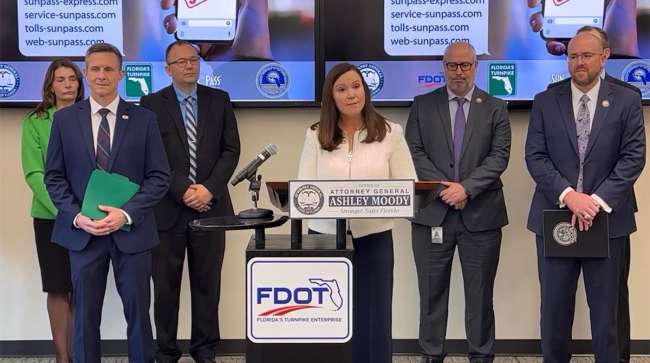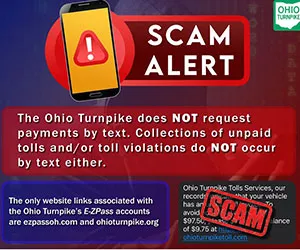Text Message Scammers Seek Fake Toll Fees in Multiple States

[Stay on top of transportation news: Get TTNews in your inbox.]
The FBI and tolling operators across the nation are issuing warnings about “smishing” text message scams being sent randomly to cellphones asking people to pay fake toll charges on fraudulent websites.
While the fake messages aren’t sent specifically to truckers or actual tolling customers, everyone with a cellphone can find themselves a target of this text scam, Charles Cyrill, spokesperson for the Ohio Turnpike and Infrastructure Commission, told Transport Topics.
The Ohio Turnpike recently sent an email alert to some 500,000 of its E-ZPass customers that it doesn’t request its E-ZPass customers to pay via text.
“Collections of unpaid tolls and/or toll violations do NOT occur by text either,” the alert stated, reminding customers that its legitimate web addresses are ezpassoh.com and ohioturnpike.org.

Ohio Turnpike Association
Anyone receiving fake toll text messages should file a complaint with the FBI’s Internet Complaint Center (IC3). Smishing attacks are social engineering ploys by cybercriminals who send false text messages to trick people into downloading malware, sharing sensitive financial information or sending money to crooks.
Mark F. Muriello, vice president of policy and government affairs at the International Bridge, Tunnel and Turnpike Association, called the tolling text scams clever and opportunistic crimes that continue to cause problems.

Muriello
“The fraudulent messages communicate low toll values owed, combined with the sense of urgency to avoid potentially high fees and risks of vehicle registration or license suspensions. The combination often tricks unsuspecting victims into providing details of their personal information,” Muriello said. “Targeted phone numbers appear to be chosen at random and not necessarily associated with toll accounts or use of toll roads. Scammers have been growing in their sophistication, including more authentic-looking websites and believable sounding URLs.”
Lisa Shearer-Salim, the Oklahoma Turnpike Authority’s communication and marketing manager, said OTA learned about these attacks in April and sent alerts via email, its website and social media.

Shearer-Salim
“OTA is working with a third-party vendor to collect delinquent toll balances via a text message campaign. OTA worked to ensure those vendor text messages were identifiable as a legitimate attempt to collect a debt and encouraged customers to reach out to our customer service line if they had any concern or questions,” Shearer-Salim said. “While this smishing activity did have a limited impact in Oklahoma, fraudulent activity is a concern for everyone. We appreciate the FBI’s proactive stance to give consumers information and tools to protect themselves from fraud.”
Rachel Bell, Kansas Turnpike Authority director of business services and customer relations, said Kansas residents are now being targeted with fake text messages from a supposed “Kansas Toll Services” seeking money for unpaid tolls with an urgent request to pay to avoid a late fee.
“The targeted phone numbers seem to be chosen at random and are not uniquely associated with a toll account or use of toll roads,” Bell said. “The Kansas Turnpike does not send text messages for toll payment.”
Texts lying about owed toll payments have exploded since the FBI issued its alert April 12 after getting 2,000 complaints from at least three states about smishing texts from impostor roadway toll collection operators. The FBI said the text messages had almost identical wording and requested similar toll payment amounts with false claims about toll money owed. The FBI revealed a typical toll smishing text says: “(State Toll Service Name): We’ve noticed an outstanding toll amount of $12.51 on your record. To avoid a late fee of $50.00, visit https://myturnpiketollservices.com to settle your balance.”
The only differences in the crooked text messages were changing website links and phone numbers indicating the scheme was moving from state to state.
The FBI asks people who receive the phony toll text messages to file a complaint with the IC3 (ic3.gov) that gives the phone number from where the text originated and web address in the text message.
What You Can Do
Anyone receiving the ploy also should:
• Check their account using the toll service’s legitimate website.
• Contact the toll operator’s customer service phone number.
• Delete any smishing texts received.
• If any link has been clicked or information has been provided, take steps to secure personal information and financial accounts. Dispute unfamiliar charges.
Less than two weeks after the FBI’s warning, IBTTA alerted toll operators about smishing attacks in six states impersonating the Central Texas Regional Mobility Authority, Florida’s Turnpike Enterprise, Illinois Tollway, New Jersey Turnpike Authority, North Carolina Department of Transportation and Pennsylvania Turnpike Commission.
A fake text released April 18 by the N.J. Cybersecurity & Communications Integration Cell read: “NJ Turnpike toll services: We’ve noticed an outstanding toll amount of $13.34 on your record. To avoid a late fee of $50.00, visit https://njtollservices.com to settle your balance.”
Michigan Attorney General Dana Nessel warned residents in May about deceptive texts, one asking for money for unpaid tolls with a $50 late fee if payment wasn’t settled immediately and another with phony toll company weblinks.
Fraudulent Websites
• sunpass-service.com
• sunpass-help.com
• sunpass-online.com
• sunpass-florida.com
• sunpass-toll.com
• sunpass-tolls.com
• sunpass-express.com
• service-sunpass.com
• tolls-sunpass.com
• web-sunpass.com
“Scammers craft these messages with links designed to steal consumers’ personal and financial information,” Nessel said. “It’s important for residents to recognize the signs of smishing texts so they aren’t duped out of their hard-earned money.”
Florida Attorney General Ashley Moody issued a video consumer alert about shutting down 10 impostor websites posing as an official SunPass website to cheat E-ZPass users out of money.
North Carolina Attorney General Josh Stein warned residents after hearing of “fake robo-texts pretending to be a toll road collection service.”
Tolling operators continue to issue customer alerts. The PA Turnpike stated July 13 that fake texts have been going out saying they are “from ‘Pennsylvania Turnpike Toll Services” and seeking payments.
Want more news? Listen to today's daily briefing below or go here for more info:

